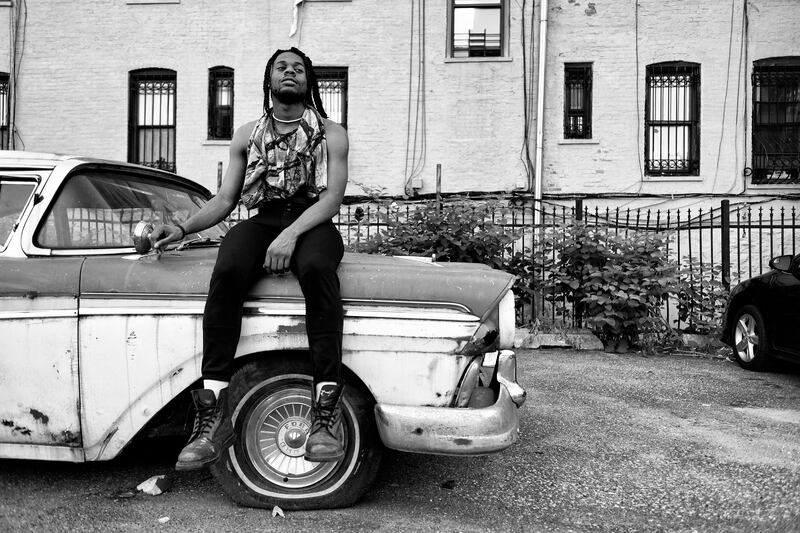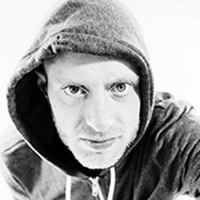Standing in the middle of the Upper West Side’s Apple Store in Manhattan, 25-year-old artist and rapper Prince Harvey seemed at home, almost like he knew what was going to happen next.
“As soon as I jump on the table, they’re going to kick us out. So just keep taking pictures,” Prince says, as he puts on a bright silver, ankle-length trench coat and hops on the wooden display top closest to the entrance.
It only takes 10 seconds before he’s proven right. An employee shuffles over to us without missing a beat.
“All right, I told you already, chief: no pictures,” the employee says.
Harvey, now standing on Broadway after being asked to once again leave an Apple Store, pauses to consider his next move.
“I would take you to the SoHo store,” he says with a smile, “but security knows me there.”

Familiarity is an understatement. After a second computer failure left him without a means to record his album and no money to buy a replacement, Prince finished recording the vocals and backing instrumental tracks for his new album entirely in that one Apple Store.
Prince Harvey sang, hummed, and rapped into a display computer at the SoHo Apple Store every weekday for four consecutive months.
The album, after all, is called PHATASS—an acronym for Prince Harvey At The Apple Store: SoHo.
Monday through Friday, rain or shine, Harvey would make the trip across the East River at 9 a.m. on the J train from Brooklyn to the Apple Store on the east side of Manhattan
Every track on the album is made with only human voices—the vast majority of which are his, save for the occasional appearance of a guest who came to the store help him out.
Had everything gone to plan, Prince never would have been dodging security in the Apple Store while recording beats to back his vocals.
“It wasn’t my plan to record this at the Apple Store. First, my computer died. Then my external [hard drive] died,” he says. “New York is expensive. I couldn’t just buy another laptop. I just thought, ‘I’m going to die before anyone knows I’m hot.’”
Starting over twice was bad enough, but he would have to start over at least once more after his last piece of equipment was stolen.
“I had a date, and I wanted to go to Chinatown to buy squid and I was rushing, and left the hard drive with everything plugged in, and when I came back, it was gone,” he says. “That’s when I realized I need to step everything up to, like, maximum intensity—as far as motivation and desire [to complete the album] goes.”
While in the process of an eviction from a Bushwick, Brooklyn loft that he shared with 20 roommates and was eventually demolished to make way for luxury apartments, Prince made the Apple Store a second home, befriending a pair of employees who would bend corporate rules to help him record the album.
“I’m not gonna say their names because they might get in trouble,” he says. “But if one of them wasn’t there, the other one was.”
Eventually Prince discovered that hiding files in the trash on the display computers would save them from the memory wipe that is scheduled every night when the store closes. This would give him a way to finish the album once and for all—if he could manage to avoid security and other employees who weren’t so understanding.
Plus, he could always email his work at the end of the day, or take it with him on a thumb drive. But other problems still arose that were impossible to foresee.
“One time there was a fire drill and I was trying to save my work, and this lady came over and disconnected the thumb drive while it was saving,” he says.
But the fire drill—compared to a stolen or broken laptop—was just another minor obstacle. After five days a week for 16 weeks, he had completed his album without a studio, and without instruments. He did it all without anything but his own voice and a microphone that didn’t belong to him.
“I don’t think I’m poor. Poor is a mentality. I mean, I can be broke—no money in my pocket—but I’ve never been poor. I’ve been rich my whole life,” he says.
“But I do want money. I want to tour. I want to perform for different people,” Prince says. “Shit, I’ll go to Antarctica for the penguins if they’re feeling it.”
Harvey, who wrote his first song at age 8 while still living on the Caribbean island of Dominica, has eschewed a formal music education, instead using a preternatural sense of arrangement and an early interest in poetry and spoken word as his introduction to music composition. The particular focus on vocal performance is obvious.
“I wasn’t interested in popular music. Nothing was about me or people like me. So I want to reinvent the future and music,” he says. “I’m just a creator. I want to inspire other people to create—show them that you don’t need all these things to be successful.”
Prince stays busier than most people who claim full-time employment. He houses events, he records with other artists, and he even makes a line of his own rum punch. He’s already started plans for his next project featuring a Brooklyn producer, DJ, and frequent collaborator Ambient Boi.
His fast-paced lifestyle shines through in PHATASS, which will be released on July 26. It doesn’t sound much like popular music, but it’s raw with emotion—visceral, unconventional, unapologetic. Even to the security guards.






